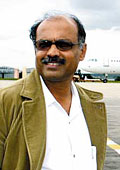 |
"We have built an airline
which is the second largest in the country and has more than
20 per cent market share"
Capt. G.R. Gopinath
MD, Air Deccan |
Captain
G.R. Gopinath is no stranger to adversities or crises. In fact,
when Air Deccan's maiden flight was grounded because of a minor
fire in August 2003, most people wrote off the former silkworm
breeder and his low-cost carrier as a non-starter. But Gopinath
simply brushed aside the embarrassment, saying to himself: "he
who walks, stumbles". In its three-and-a-half years of existence,
both Air Deccan and Gopinath have walked a lot and stumbled, too.
Last year, in particular, they did a lot of the latter. A weak
market ensured that Air Deccan's Rs 373-crore IPO had to be extended
but it did mobilise the target amount. Delayed flights and allegations
of overbooking have led to a lot of negative publicity. And, to
make matters worse, the company has been bleeding money. The Bangalore-based
airline posted a loss of Rs 213 crore for the third quarter ended
March 2007 on revenues of Rs 457.45 crore. The question on everyone's
lips is: can Air Deccan survive? And if it does, the next question
is: can Gopinath retain control of his baby? Crucial to both questions
is the ability of the airline and its promoters to raise $100
million (Rs 410 crore) over the next few months-this money is
essential if Air Deccan is to survive as an independent airline.
The man himself declines to discuss too many
numbers, but industry analysts believe that the company is cash-strapped.
Says a Mumbai-based analyst who tracks the aviation sector: "The
airlines business is extremely capital intensive. Given the speed
at which Air Deccan has been burning cash and given the losses
it has been posting over the past few quarters, the airline will
have to raise money within the next two months; otherwise, it
may become history."
Those are ominous words, but Gopinath does
not give the impression of a man standing at the edge of a precipice.
"Air Deccan will raise $75-100 million (Rs 307.5-410 crore)
within a month. We are looking for a strategic investor who has
a long-term vision for the industry rather than one who will come
in for only two or three years," he says. The company has
mandated Mumbai-based Edelweiss Capital to identify suitors and
raise the amount. Gopinath refuses to name the potential investors,
but says there is more than one and that the process of due diligence
is on. Sources close to the deal say that private equity firm
Texas Pacific Group (TPG) and Anil Ambani's Reliance ADAG are
among those interested.
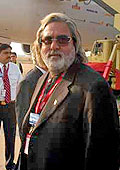 |
"The man doesn't know
what he's talking about. He runs a publicly listed company
and I am expressing interest"
Vijay Mallya
Chairman & CEO, Kingfisher Airlines |
Liquor baron and Kingfisher Airlines boss
Vijay Mallya is also said to be interested in a possible buyout.
Reacting to Mallya's interest, Gopinath, who is said to be close
to the former, said: "He has no right to talk about taking
over Air Deccan." Speaking to BT aboard the Airbus A380 demonstration
flight from Delhi to Mumbai recently, Mallya retorted: "The
man doesn't know what he's talking about. He runs a publicly listed
company and I'm expressing interest; the crucial word here is
interest. That is not a crime to the best of my knowledge. Tell
me, if someone expresses a desire to take over UB, can I stop
him from expressing that interest?"
Just as the war of words seemed to be peaking,
Gopinath did a volte face, and, in a 15-minute speech at the second
anniversary celebrations of Kingfisher, said: "Our airlines
complement each other," and went on to feed Mallya some cake.
Does that mean that a deal is in the offing? It's a tantalising
thought, but neither party is saying anything more on the topic.
But there's a strong business rationale for a marriage between
the two. Current government regulations stipulate that an airline
must have been operational for at least five years before it can
fly on foreign routes. Air Deccan, which began operations in 2003,
will become eligible to do so next year. So, taking it over will
give Mallya the wherewithal to fly abroad-something he really
wants to do. And being taken over by Kingfisher will give Air
Deccan access to funds it so badly needs. However, this rationale
may come apart if the government relaxes the "no flying abroad
before you're five" rule to three years. At the time of going
to press, there was distinct possibility of an announcement to
this effect being made. So, a possible deal depends on several
imponderables that will become clearer only with time.
Incidentally, it's not that Mallya, or anybody
else wanting to take over Air Deccan, really needs Gopinath's
blessings. The promoters-Gopinath, Capt. K.J. Samuel and Vishnu
Raval-own a combined stake of a little more than 22 per cent.
The balance is held by the public at large. There has been speculation
in the media that Lachmandas Ladhani, who owns more than 11 per
cent in the company, may be interested in cashing out. There are
also at least three other shareholders who own between 7.5 per
cent and 13.5 per cent stakes who may be tempted to sell out at
the right price. Gopinath, who himself owns about 11 per cent,
however, puts up a brave face. "Look at Infosys (Technologies).
A promoter like (Non Executive Chairman and Chief Mentor) N.R.
Narayana Murthy has a very low shareholding in it (for the record,
Murthy and his family own 5 per cent in Infosys and the promoter
group controls 16.54 per cent). It's not a question of who is
in control but what's good for Air Deccan. And finally, it's a
decision of the shareholders. If they don't want you there, then
you have no business being there," says Gopinath.
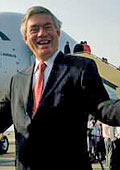 |
"We understand that
India is a really competitive market. We do keep a close eye
on our customer airlines"
John Leahy
Vice President (Sales), Airbus |
For now, though, the official position is
that Air Deccan is looking to sell a 15-25 per cent stake in itself
for $75-100 million (Rs 307.5-410 crore). "We have been able
to raise funds whenever we needed to," says a confident Gopinath.
Besides the IPO last year, Air Deccan had, in 2005, mobilised
$40 million (Rs 184 crore then) by placing equity with ICICI Ventures
and private equity firm Capital International. "Today, Air
Deccan has a lot of suitors because in a short span, we have built
an airline which is the second largest in the country and has
more than 20 per cent market share. It also has the largest route
network covering 65 cities," he says.
These are undoubtedly Air Deccan's greatest
strengths but are also partly responsible for the distressing
financial position it finds itself in. "Air Deccan started
off with very little capital-perhaps only a few lakhs. The only
option it had was to grow as fast as possible and gain market
share and create scale to challenge the existing players. Otherwise,
it simply wouldn't have survived," says Kapil Kaul, CEO,
Centre for Asia Pacific Aviation (CAPA) Indian Subcontinent &
Middle East, an aviation consultancy. "But that kind of growth
does not come without consequences; it burns a lot of cash."
Competitors like SpiceJet know that Air Deccan
is in an unenviable position. "Capt. Gopi is a really nice
guy, but just look at his books; Air Deccan lost over Rs 200 crore
on revenues of less than Rs 500 crore in just one quarter. In
earlier quarters, it made money by leveraging its planes and selling
seats months in advance, but last quarter there was no 'other
income' to hide the real state of its finances," says Ajay
Singh, Director, SpiceJet, who attributes Air Deccan's higher
costs to a complex fleet of both ATR and Airbus planes. "It
operates in several stations which have only one flight a day.
This complexity, of both fleet and network, has added hugely to
overheads, like having to service several maintenance bases; then,
if a plane breaks down in such a place, the only way to deliver
spares is by road," says Singh, adding that this leads to
cancellations and delays-and a consequent downgrading of the brand.
"SpiceJet has costs that are 25 per cent below Deccan's,
despite the fact that we don't sell seats as cheaply as Air Deccan,"
he adds.
Mallya, who claims that Kingfisher has among
the highest per-passenger yields, of Rs 4,500, in the industry,
says that Air Deccan loses Rs 300 per passenger. "From what
I've heard, Air Deccan has a per-passenger revenue of Rs 2,600
against a per-passenger cost of Rs 2,900," he says.
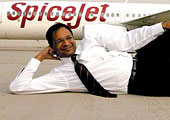 |
"SpiceJet has costs
that are 25 per cent below Deccan's, despite the fact that
we don't sell seats as cheaply as Air Deccan"
Ajay Singh
Director, SpiceJet |
In a bid to ease its cash flow problems, Air
Deccan has struck a $100 million (Rs 410 crore) deal with two
European banks, under which it has assigned its contract with
Airbus for the supply of 60 aircraft in favour of a Special Purpose
Company. The money, the first installment of which it has already
received, will come in over the next 15 months in four tranches.
But this ploy has its share of detractors. Several airlines around
the world are desperate to buy new Airbus planes which are in
short supply; and Air Deccan will have to match the higher prices
that other potential buyers will doubtless offer to take delivery
of the planes it had ordered. So, though Gopinath's "innovative
deal" has got Air Deccan some cash respite, it may come in
the way of its future expansion plans. Airbus, too, is keeping
a close watch on these developments. John Leahy, Vice President
(Sales), Airbus NA, was cautious while responding to BT. "We
understand that India is a really competitive market. And while
we only sell planes, we do keep a close eye on our customer airlines,"
he says. Airbus, obviously, isn't the only one. Several rivals,
investors and others are also doing the same.
Now, for the second question on many people's
lips: will Capt. Gopinath continue at the helm if a strategic
investor steps in?
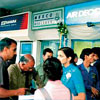 Senior
industry executives are not very sure about Gopinath's future.
"After having burned so much money, and gambling Air Deccan's
future expansion for cash upfront, it will be extremely surprising
if someone lets Gopinath retain a say in the management of the
airline," says a top executive in a rival airline. But the
Air Deccan chief is not without his backers. "Capt. Gopinath
has become a brand ambassador for Air Deccan and the Indian low-cost
airline industry. Moreover, he has the experience of dealing with
the government, policy makers and the bigger competitors in the
business. Whoever buys in will do well to keep Gopinath at the
helm," says an other industry executive who asked not to
be named. Senior
industry executives are not very sure about Gopinath's future.
"After having burned so much money, and gambling Air Deccan's
future expansion for cash upfront, it will be extremely surprising
if someone lets Gopinath retain a say in the management of the
airline," says a top executive in a rival airline. But the
Air Deccan chief is not without his backers. "Capt. Gopinath
has become a brand ambassador for Air Deccan and the Indian low-cost
airline industry. Moreover, he has the experience of dealing with
the government, policy makers and the bigger competitors in the
business. Whoever buys in will do well to keep Gopinath at the
helm," says an other industry executive who asked not to
be named.
So, what does the future hold for Air Deccan
and its founder? CAPA's Kaul believes that Gopinath, "the
Mohinder Amarnath of Indian aviation, the man with most comebacks",
will be in a great position to exploit market conditions once
fundamentals (fuel costs, airport infrastructure, etc.) improve.
He expects that process to begin by late 2008 and gain momentum
by 2010. But to survive that long, Air Deccan will have to immediately
secure a war chest of $100-$150 million (Rs 410-615 crore). And
whoever invests this money will want a say in how the airline
is run… which brings us back to the question: can Gopinath
survive? A clearer picture will unfold over the coming days.
-additional reporting by Kushan Mitra
|









 Senior
industry executives are not very sure about Gopinath's future.
"After having burned so much money, and gambling Air Deccan's
future expansion for cash upfront, it will be extremely surprising
if someone lets Gopinath retain a say in the management of the
airline," says a top executive in a rival airline. But the
Air Deccan chief is not without his backers. "Capt. Gopinath
has become a brand ambassador for Air Deccan and the Indian low-cost
airline industry. Moreover, he has the experience of dealing with
the government, policy makers and the bigger competitors in the
business. Whoever buys in will do well to keep Gopinath at the
helm," says an other industry executive who asked not to
be named.
Senior
industry executives are not very sure about Gopinath's future.
"After having burned so much money, and gambling Air Deccan's
future expansion for cash upfront, it will be extremely surprising
if someone lets Gopinath retain a say in the management of the
airline," says a top executive in a rival airline. But the
Air Deccan chief is not without his backers. "Capt. Gopinath
has become a brand ambassador for Air Deccan and the Indian low-cost
airline industry. Moreover, he has the experience of dealing with
the government, policy makers and the bigger competitors in the
business. Whoever buys in will do well to keep Gopinath at the
helm," says an other industry executive who asked not to
be named.